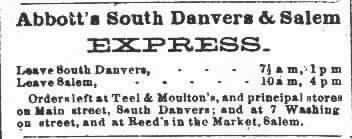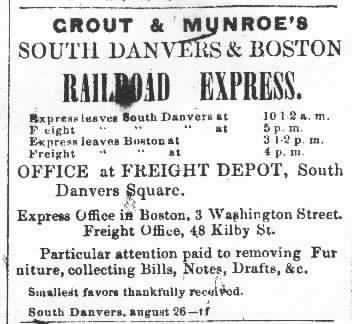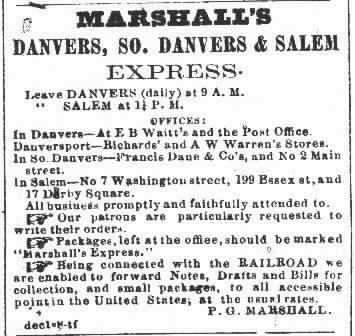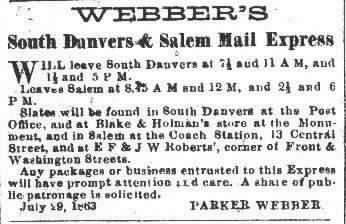|
Transportation
1860
Transportation
1861
Transportation
1862
Transporation
1863

Fig. 21.1. Advertisement
|
South Danvers Wizard, 1/13/1864,
p. 2/6
“The Eastern Railroad for 1863 exhibits for gross earnings $812,557;
for working expenses $421,963; leaving for net income $390,594 equal to
8.25 percent, upon the cost.”
South Danvers Wizard, 1/13/1864, p. 3/1
AMUSEMENTS IN BOSTON under Entertainments.
South Danvers Wizard, 1/20/1864, p. 2/1
TOWN MEETING under South Danvers, Massachusetts, People
& Places S.
South Danvers Wizard, 1/20/1864, p. 2/5
“The Horse Railroad Co. had a new four-horse track-clearer on trial
yesterday. It is so constructed as to move a snow plow in front designed
to cut off the snow and ice from the rails, while an iron plate following
each hind wheel throws or shovels the fragments and loose snow off on one
side. It is ingeniously devised.” Reprinted from the Observer.

Fig. 21.2. Advertisement

Fig. 21.3. Advertisement
South Danvers Wizard, 1/27/1864, p. 2/6
HORSE RAILROAD [For the Wizard] – “In times like these, when the fever
is raging in regard to horse railroads, it becomes the people to look calmly
and rationally at the advantages and disadvantages which such roads will
be to the town and villages through which they may pass.
We understand a petition is in circulation
for a road from Salem to this town, and it is already pretty well filled
with the names of our citizens. No doubt many of those who sign the
petition do so without considering for a moment the serious objection of
having the track laid through the street and the great expense of keeping
the roads in repair, which will be nearly double. There are other
and more important objections. We have no doubt there are some places where
the road will be an advantage; - for instance, where there are a number
of roads running from the villages to a city, we have no doubt it brings
the trade from the villages to the city. And we understand that, in Salem
the storekeepers say that since the horse railroad has commenced operations,
their trade has extensively increased; so that, if we are to have one from
Danvers, it will increase still more, and our traders will be minus any
profit from the horse railroad.
We sincerely hope that when the time comes
for action that the people of this town will give the matter a thorough
investigation and act accordingly.” Signed “Danvers, January 26, 1864."

Fig. 21.4. Advertisement
South Danvers Wizard, 2/3/1864, p. 2/2
TOWN MEETING – “Opposed the petition of the city of Salem so
far as the taking of water from Brown’s Pond and Spring Pond; Opposed any
grant to the Eastern Railroad Company which shall in any way impair
or prejudice the rights of the traveling public. A petition of the
Salem & South Danvers Railroad Company for a charter for a horse railroad
to Danvers was studied by a committee consisting of James P. King, Wm.
H. Little, Joseph Poor, A. W. Bancroft, Dana Woodbury, with the following
result:
Voted: That the business interests of South Danvers and Lynn,
and the intimate relations and constant communication and travel between
the two places, imperatively demand the construction of a Horse Railroad;
but that it is of equal importance that the enterprise should be in the
hands of those who are identified with the local interests and business,
and will make it subservient to the prosperity of South Danvers and Lynn,
and not under the control of men or corporations who would undertake it
for speculative purposes, and manage it for private emolument rather than
for the public welfare, and that, therefore, the citizens of South Danvers
are earnestly in favor of the prayer of the petition of William H. Little
and others, and as strongly opposed to the granting of the petition of
the Salem & South Danvers Railroad Company.
Voted: To adjourn.”
South Danvers Wizard, 2/3/1864, p. 2/3
NEW HORSE CAR – “As was said at the late town meeting, the accommodations
on the Salem and South Danvers Horse Railroad are improving. The
cars start exactly at the time stated. There is scarcely any delay
at the turnouts, and the passage from one point to another is made as quickly
as could reasonably be expected. The old cars which the company were at
first compelled to use are being rapidly replaced by those of a new and
elegant pattern. Yesterday, a new car from the manufactory in Salem
was put upon the track. It was a fine piece of workmanship – large
and commodious – and reflects credit alike upon the builders and the enterprising
company who are doing so much for the accommodation of the public.
We would further add that this car is sixteen
feet long and seven wide, is built mostly of iron, is well lighted, handsomely
painted and ornamented, and capable, on a ‘rush’ of carrying nearly a hundred
passengers.”
South Danvers Wizard, 2/10/1864, p. 2/5
“A petition has been presented in the General Court, from Richard Tenney,
and 90 others of Georgetown, in aid of the petition of the Salem and South
Danvers Railroad for an extension of the road to Danvers. The people
of Georgetown and that section of the County manifest much interest in
this matter, as the extension to Danvers will prove of great convenience
to them.”
South Danvers Wizard, 2/17/1864, p. 2/2
DANVERS VS. HORSE RAILROAD [Letter to the Editor] – “Mr. Editor, -
I noticed in one of your late numbers an article upon the disadvantages
of Horse Railroads – more particularly, however, upon the disadvantages
of having one to connect Danvers with Salem. The writer of the article
to which we allude, seemed to object to the proposed Horse Railroad for
two reasons: First, that it would injure our streets and make additional
expense in keeping them in repair. Secondly, that it would injure
trade in Danvers. These, we believe, were his principal
objections to having a Horse Railroad to connect the towns of Danvers and
Salem. But are such objections valid, when we consider, the many
advantages which would result from such a mode of conveyance? That
there are some objections to Horse Railroads in any locality, we
shall not deny. In fact there is not an institution nor a corporation
in the whole country which does not annoy or discommode a certain few.
Houses of religious workshop, colleges, literary institutions, the hundreds
of different kinds of manufactories, the steam cars, telegraph lines, and
everything else of the kind are, without doubt, detrimental to the interests
and pleasures of certain individuals. But shall we throw them all
aside because they deprive a few of certain enjoyments that they would
otherwise have? Shall we destroy our houses of religious workshop
for the reason that they may be a little too near someone’s dwelling house
or shop, and therefore an annoyance to him on certain occasions?
Shall we abandon the steam cars because certain persons, through whose
land, or near whose dwellings they pass, are put to some trouble thereby?
In short shall we abandon every enterprise because some of their results
may be objectionable? That is the question, and it is the only question
for us to answer in the case of the proposed Danvers and Salem Horse Railroad.
There are some six or eight men in this town
who keep a number of fancy horses, and who have but little else to do but
exercise them by driving to Salem and back two or three times every day,
that are opposed to the Horse Railroad. And is it not plainly to
be seen why they are opposed to it? It is simply because it would
discommode them a little in their rides for pleasure from here to Salem.
There are also a few traders who think their business would be injured
by the Horse Railroad. But are either of the above objections to it sufficient?
Shall ninety-nine one-hundredths of the inhabitants of the town of Danvers
be put to trouble and expense daily on account of the present impracticable
mode of conveyance to Salem, in order that the pleasure and interests of
some few may be gratified and enhanced? In considering this question
we ought to look to the greatest good of the greatest number. If nearly
all of the people of Danvers are to be benefited by the proposed new mode
of conveyance to Salem, why not let them have it? It is evident to
all that the horse car is much more convenient and preferable in many respects,
to the omnibus; besides the omnibus does not run often enough to satisfy
the wants of the people. There should be some means of going from
Danvers to Salem, by public conveyance, as often as every hour.
The omnibus runs by
six times during the day, leaving the post office at 7-1/2, 9 and 12 o’clock
A.M. and 1, 3, 3-4 and 6 o’clock P.M.; and here ends our means of going
to Salem by public conveyance, except we can go on the steam cars three
times during the day. It requires no argument to prove that there
should be some plan adopted to remedy the matter. There is not a
day passes when there are not more or less who are put to trouble and expense
on account of the present inadequate means of conveyance to Salem.
The wants of the people of both Danvers and Salem demand a Horse Railroad
to connect the two towns, and in this way they can go from one place to
the other as often as every hour, from 7 o’clock in the morning until 9
o’clock in the evening; and they will not be satisfied with any conveyance
less convenient and practicable.
Instead of injuring the trade in Danvers,
the Horse Railroad would increase it, if the Danvers traders would keep
as great a variety of goods, and sell them as cheap as the Salem traders
do; and we believe that, everything considered, goods can be sold at lower
prices in the former than in the latter mentioned town. The Horse Railroad
will have a tendency to raise the value of real estate in Danvers; - such
has been the case in other places, and we know of no reason why such should
not be its effect in this town.
It is our purpose, in this article, to make
mention of the many advantages of Horse Railroads; but it cannot be otherwise
than they add much to the prosperity and interests of the people of the
many towns through which they pass. Such, at all events, is the most
unanimous opinion of those, who by observation and experiences, knew better
about the matter than entirely ignorant of it. We believe on the whole,
that no honest and unselfish man can deny the proposed Horse Railroad would
be of incalculable interest to the inhabitants, and general welfare of
the town of Danvers and its neighboring towns.”
South Danvers Wizard, 3/2/1864, p. 2/3
EXPRESS TO LYNN – “Mr. Samuel Trask, of this town, is making arrangements
to run an express between Salem, South Danvers and Lynn. He will
probably commence by the first of next week.”
South Danvers Wizard, 3/9/1864, p. 2/2
HORSE RAIL ROAD HEARING – “The second hearing before the Legislative
Committee took place last Thursday at the State House. A. A. Abbott,
Esq. appeared as counsel for Wm. H. Little and other petitioners; S. H.
Phillips and S. C. Bancroft, Esq. for the Salem & South Danvers Railroad
Company. Upon the petition for a road from Salem to Danvers, Messrs.
John W. Poeter, Moses H. Hale and Charles P. Preston were examined as witnesses,
called by the petitioners. It is not proposed to have the Danvers
road go to Salem through South Danvers but through North Salem, by the
Iron Foundry; and Danversport; though by this route it will be necessary
to pass over a small portion of our territory which makes in that direction
by Gardner Farm. Upon the petition for a road from Salem to Swampscott,
Messrs. J. P. Palmer, Eben Phillips and Representative Stimpson were examined
as witnesses. They represent that an earnest desire exists in their
town for the road. No witnesses appeared from Danvers or Swampscott,
in opposition to the projected enterprises.
The hearing will be continued next month when
the South Danvers and Lynn case will be taken up.”
South Danvers Wizard, 3/16/1864, p. 2/3
ESSEX RAILROAD [Editorial] – “Although not particularly skilled in
the mysteries of railroading, we surmise the Eastern Railroad Company are
making the Essex Railroad a profitable auxiliary to their own. We
notice that their freight trains are very long and very heavily loaded.
We learn that they are able to compete successfully with the Boston &
Maine Railroad in transporting freight from Boston to Lawrence by way of
Salem – carrying in this way some twenty tons per day. Last year
they transported by this route 5,000 tons of coal from Boston to Lawrence,
for the Pacific Mills.”
South Danvers Wizard, 3/16/1864, p. 2/3
HORSE RAILROAD – “The hearing before the Legislative Committee upon
the subject of a horse railroad from South Danvers to Lynn was concluded
last Friday. The Committee have not yet reported. One thing we think
is quite certain in regard to this matter, and that is that the Legislature
will authorize somebody to build this road, and we wish it were equally
certain that the road will be built this year.”
South Danvers Wizard ,3/30/1864, p. 2/4
SETTLED AT LAST – “There has been for some time a controversy existing
between the Boston & Maine and Essex Railroad Corporations, the former
claiming that the cars of the latter must be drawn from Sutton’s Mills
to Lawrence by their trains, thus causing great detention to the passengers.
The matter was before the Legislature, where is found that Essex Corporation
has some rights bound to be respected. The result was that a mutual
contract was made between the parties quite advantageous to the Essex,
and we hope also to the larger corporation.”
South Danvers Wizard, 5/25/1864, p. 2/5
“The Horse Railroad Hearing, yesterday afternoon, before the Board
of Mayor and Alderman, resulted in granting, in general terms, the petition
of the road for leave to place a track on Washington and Bridge streets,
in view of running the cars to Danvers, over the main road.” Reprinted
from the Gazette, 20th inst.
South Danvers Wizard, 6/1/1864, p. 2/1
FARE RAISED [Editorial] - “Owing to the very high rates of provender,
etc., the fare on the Salem and South Danvers H. R. R. has been raised
to six cents, single tickets. Packages of eighteen will be sold for
a dollar. For other changes, see their advertisement. We see
no reason why fares on all horse routes should not be higher, when we take
into consideration the present prices of hay and grain. Mr.
Simonds, the proprietor of a large stable in this town, recently informed
us that he was paying thirty dollars a ton for hay, and did not get an
extra article at that. With hay at that price, and meal at three
dollars a bag, it must cost more than twice as much to keep a horse now
than it used to in ordinary times; and we were not at all surprised when
we heard a short time ago, that fares on the horse cars would be raised.
Mr. Burnham, proprietor of the South Danvers and Lynn omnibus line, raised
his fares some twenty percent, over six weeks ago, stating to us at that
time that it was impossible for him to do any different, feed being so
high.”
South Danvers Wizard, 6/1/1864, p. 2/4
THE HORSE RAILROAD TO NORTH DANVERS – “Those most directly concerned
in the building and management of the Horse Railroad, express the opinion
that the provision, adopted by the Mayor and Aldermen, that the inside
of the track to South Danvers line on North St., with eighteen inches on
the outside, shall be paved with ballast stones the entire distance, will
prevent the acceptance of the location, and the building of the road over
the route contemplated. This belief is founded upon the opinion that,
the amount of the capital stock having been limited at the recent session
of the legislature, (which act we have not at hand) to a certain amount
per mile, the road cannot be built within the limit at present high prices
of iron and high cost of paving.”
South Danvers Wizard, 6/8/1864, p. 2/3
ETIQUETTE [Editorial] under Etiquette.
South Danvers Wizard, 6/8/1864, p. 2/3
SOLDIER’S AID – “It will be seen by advertisement in another column,
that the Horse Railroad Company generously devotes all the receipts TO-DAY
for the benefit of the soldiers. Here is a grand chance for everybody
to have a good ride, and while enjoying it, help the poor soldiers in the
hospitals.” |

